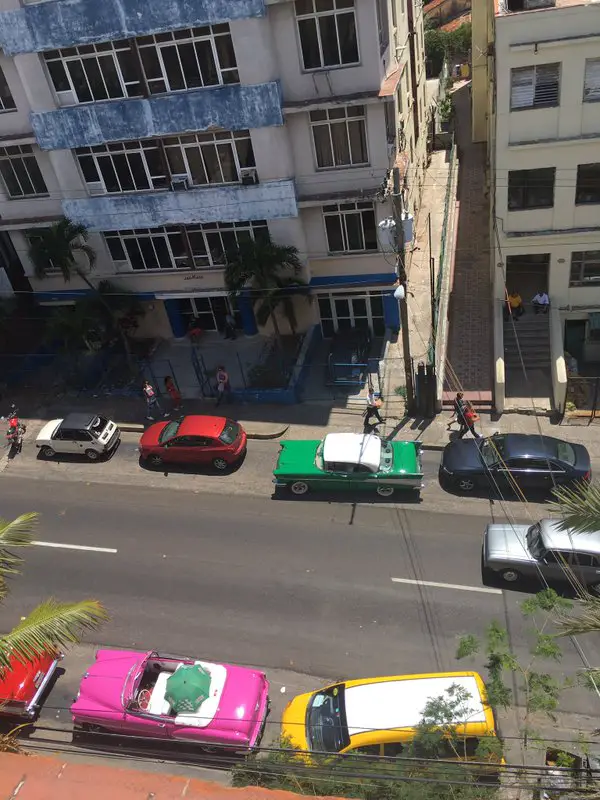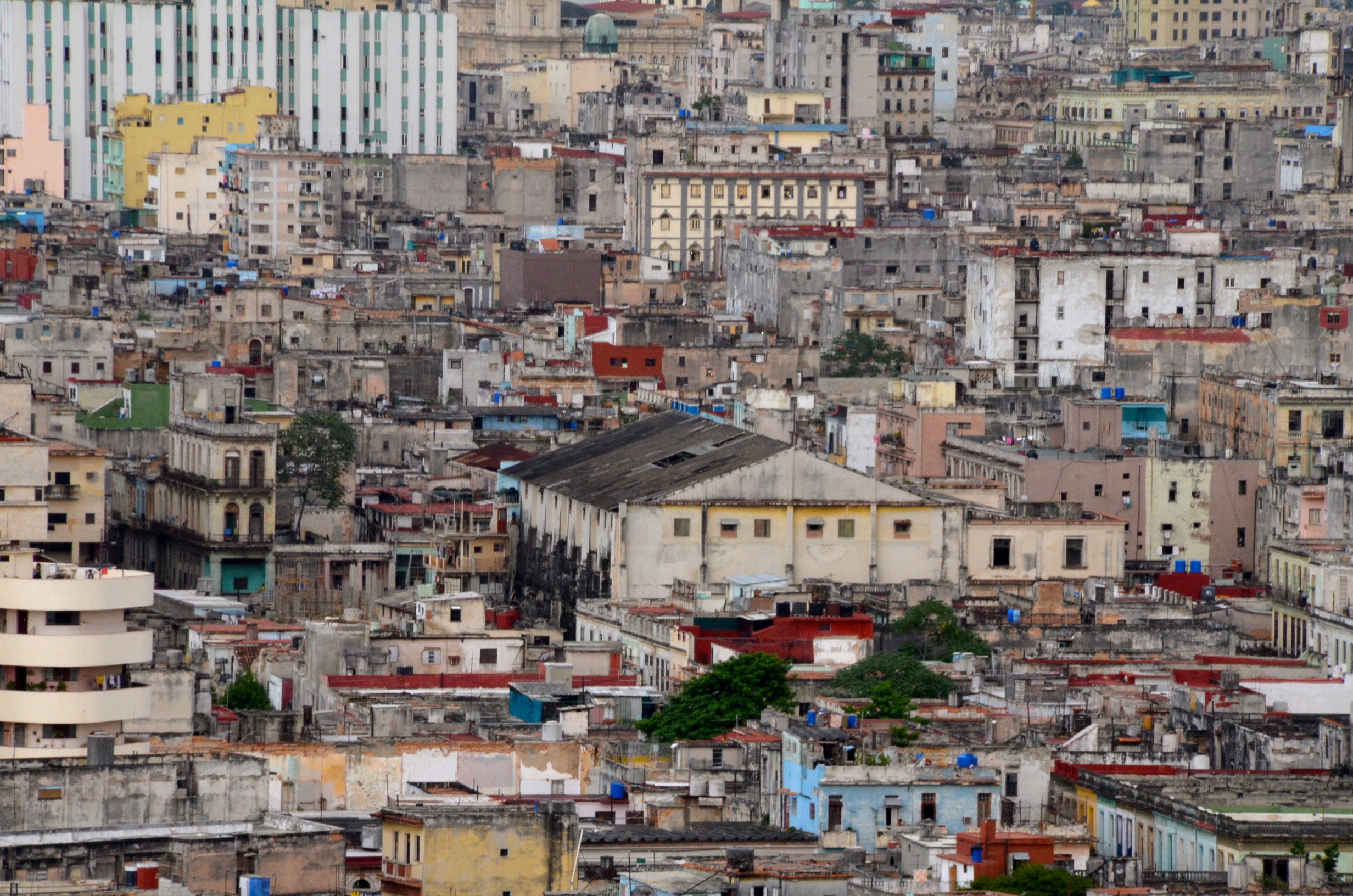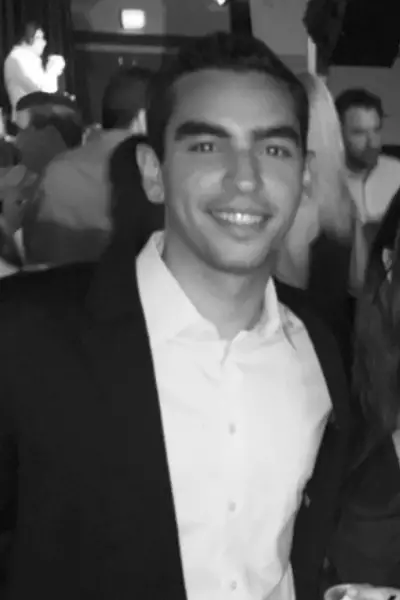On Accident, Kardashian Exposed the Country’s Desolation
The image, which juxtaposed her lavish vacation against the poverty of Cuba, reflects the fundamental problem with romanticizing the country.
By Danny Enjamio, Santa Fe College
I don’t often think about Cuba.
Stories of my parent’s homeland and the suffering of its people always felt foreign to me, but that changed with one tweet from Kim Kardashian West. Following her family’s trip to Cuba in early May, the reality TV star tweeted about how much she enjoyed the visit, along with a photo of what she felt was a beautiful picture of Havana.
After reading the tweet, I joined Cuban-Americans across generations by engaging in a collective eye roll. Obviously, the photo (pictured below) reeks with the Kardashian scent of ignorance. But, as America continues to normalize relations with Cuba, the reality has begun to set in that many Americans actually share Kim’s assessment of the country, considering it as a vacation destination without understanding the dynamics and history behind the island.

I should cut the Kardashians some slack. After all, I can’t pretend I experienced the suffering and sacrifice of the Cuban people. Like Kim, I was born in the United States and have known nothing but freedom all my life. Also like Kim, I have visited countries that treat tourists more favorably than their own citizens. I too likely spent more time enjoying the beaches during those vacations than pondering whether my mere presence was exploiting others. Indeed, I have enjoyed a rather comfortable existence. Perhaps not Kardashian-level comfort, but comfortable nonetheless.
I didn’t really know how to put my feelings on the tweet into words, so I began showing it to people, asking them what their thoughts were. That simple question yielded very passionate answers. Everybody pretty much felt the way I did: frustrated, but not surprised.
Then I showed it to my grandmother, who left Cuba with her family, including my then 11-year old mother, in 1971. She read the first line, “I love Cuba” and laughed. “Of course [Kim] loves Cuba,” she said in Spanish. “She doesn’t live there.”
As expected, my grandmother put it better than I ever could. There are basically two separate Cubas. First there’s tourist Cuba, the one people come from across the world to visit. This Cuba has a unique appeal: It’s historic, lively and of course undeniably and breathtakingly beautiful. Tourism Cuba is a tableau vivant of the 1940s and 50s, when the country operated as a modern-day Las Vegas and was the envy of Latin America.
Today, those fortunate enough to live outside the island get to experience romantic Cuba without facing the guilt of knowing the country’s other persona, which we’ll call “real Cuba.”
Real Cuba is the one that my family, and the families of so many of my closest friends, fled long ago. In this country, citizens live as prisoners to a government that cares little for them. Engineers, such as my mom’s half brother, make less than $30 a month, and doctors make less than taxi drivers. In real Cuba, the government controls the media and regulates how much toilet paper and soap a person can have. Worst of all, people responsible for murdering political dissidents are still in power.
This Cuba is kept alive by the illusion that a 57-year old revolution has succeeded, and that an impotent political ideology has cared for its citizens. It was here, in this Cuba, where a man came up to my cousin, who was visiting the childhood home of her parents, and asked her, “Why are you visiting this hell?”
It’s okay to vacation as a tourist in Cuba. There are plenty of places with imperfect governments, abject poverty and corrupt officials. But Kim was in the tourist Cuba, went to its highest point and accidentally looked over to find the Cuba that she wasn’t supposed to see.
The one 90 miles from freedom, but stuck in a different world. She looked at it square in the eyes, captured the moment and then, the woman so famous she once broke the internet, shared it with the world. Not for the purpose of exposing the horrors of a failed political experiment or exposing the juxtaposed poverty in the shadows of extravagance. No, Kim took a small but telling glimpse into the real Cuba, and enjoyed the shiny cars.
Let’s understand something about those cars. Tourists may enjoy them, but they are a constant reminder that the Cuban people are still held prisoners in a time capsule. Not much has changed in Cuba in the past 57 years, as those automobiles evidence. Their presence represents the absence of hope and incentive on the island my parents once called home.
They remind the Cuban people that although the world has moved on, Cuba will not.
Obviously for me, like my Cuban-American friends, it’s personal. That’s why so many Cuban-Americans of my generation went to Twitter to condemn the tweet. They were sticking up for their parents and grandparents who lacked voices on social media.
I grew up hearing stories of the communist Cuban government, the one still in power, taking over my paternal grandfather’s sandwich shop and my maternal grandmother’s farm when my parents were children. I heard about my mother and sisters visiting their godmother, jailed by the atheist regime for friendships she made while visiting the Vatican, in prison. Every Cuban-American whose family came to the United States from Cuba after the Castro brothers took over has heard similar stories, many far worse than the ones I did.
I guess that’s really why seeing celebrities live lavishly in Cuba confuses me: I’ve always considered Cuba to be the place people were desperate to flee, not visit. As my grandmother pointed out after I showed her Kim’s tweet, “If Cuba is so great, why do so many people want to leave?”
Indeed, hundreds of thousands of Cubans have risked their lives and left the country in search of the very same freedom that the Kardashians used to vacation there. They risk it all because the real Cuba is slowly decaying, much like the buildings behind the lovely cars in Kim’s depiction of paradise. They flee because nobody wants to live in a country that values the lives of its visitors more than its residents.
But that’s not the Cuba you see flaunted on your favorite celebrity’s Instagram or even during ESPN’s coverage of the exhibition baseball game in the country this year.
Media coverage and attention like Kim’s conceal the realities of Cuba. People are still very much suffering and held prisoner by a government run by liars and destroyers. Because it’s difficult for Cuban citizens to leave Cuba and the government restricts the internet, like inmates, their only exposure to the outside world is through letters and the occasional phone call. Kim said she felt like she went back in time and can’t wait to go back to Cuba. Over the past five decades, how many Cuban-Americans have dreamed of doing the same?
















Well written Danny Enjamio!
Danny, I commend you for a very well written article. You were able to write something that I’ve been feeling, but have had a tough time trying to express to others. Job well done!
Danny, thank you for writing this excellent article. I too agree wholeheartedly with your grandmother. Young people like you give me such hope. You are a principled young man and that is so refreshing to see now a days.
Keep questioning with boldness, holding to the truth and speaking without fear!
I left Havana, Cuba, at age 12. I agree, but I must correct something: Cuba in the 1950’s was NOT A LAS VEGAS! Havana had a million inhabitants then, and practically all of working age were very industrious in every type of job common in most world-class cities then. Traveling through most of the city in my school bus (from Vedado to Marianao each day), or my father’s car to his offices downtown or to bust family here and there, or the public buses (and tramways pre-1955), we simply would seldom, if ever, see any signs of a gambling establishment. We did see street vendors who sold tickets to the National Lottery, and some who sold for the “charadas chinas” but no gambling “casinos” because there were perhaps a dozen of them, or slightly more, with small gambling rooms, mostly dispersed and isolated from each other, with not a single sign advertising them, other than a non-description sign at the entrance, no different than the signs of any store. Adults knew where some were, but gambling was a tiny, tiny facet of our Havana. The word “casino” also does not mean a gambling place; I still have a membership card, with my foto at age 10 or so, as proof of my membership in the Casino Español, a strictly social and sports club where we held national swimming championships, had boating, and other amenities. Same with prostitution and whatever one may associate with Las Vegas. The Mafia? I hear and read so much about Italian Mafiosi, yet they were not affecting our lives, because they catered to American tourists mostly, and to the few rich Cubans who indulged along. We lived excellent lives, had a great economy, worshipped in churches and attended excellent schools, had tremendous and cheap medical care, and might see or hear about gambling or Mafiosi once in a blue moon. I’ve seen Las Vegas and it does not remind me one iota of my youth in Havana.
Julio, Thank You for reading and taking the time to give your input. Your point is certainly well taken; however, I want to make sure you understand that I was simply saying that Americans enjoyed Cuba in the 1940’s and 50’s similarly to how they enjoy modern-day Las Vegas. This is a comparison others have made, and I used it to provide a visual for what Cuba used to be. Obviously it was just a minor point and, being that you clearly have a great understanding of Cuba past and present, I hope it didn’t ruin the overall piece for you.
great comments and a great article